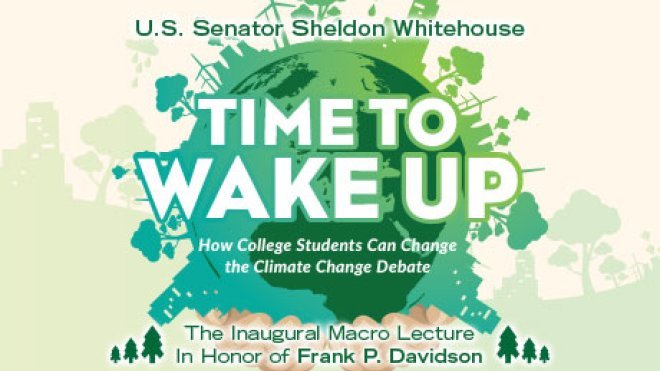RWU to Lead Effort to Create Environmental Impact Against Climate Change
U.S. Senator Sheldon Whitehouse to issue a call to action on climate change and launch a student-led Conservation Corps at Roger Williams University on March 31

BRISTOL, R.I. – Building on sustained efforts to combat human-induced climate change and create measurable environmental impact via reforestation projects across Rhode Island, Roger Williams University today announced a multi-year initiative to launch a student-led Conservation Corps that would initially serve Rhode Island and the region. The new initiative will unite leaders from federal, state, municipal and academic sectors to develop and implement forestry-related programs that, over time, will measurably improve the local environment and ultimately drive climate change policy and legislative action.
United States Senator Sheldon Whitehouse will officially launch the project on March 31 when he delivers the University’s inaugural Macro Lecture, “Time to Wake Up: How College Students Can Change the Climate Change Debate.” There, the Senator will issue a formal call to action to encourage college students and community partners to help him address climate change with achievable action WCAI and WGBH Radio science correspondent Heather Goldstone, whose weekly live show Living Lab is a trusted source of information on the intersection of science and culture, will join the senator for a Q&A segment following his speech.
“I applaud the students and faculty of Roger Williams University for taking action right here at home to counter the threat of climate change,” said Senator Whitehouse. “By working to make a difference in our state and across the region, the Conservation Corps can influence national climate policy and global climate outcomes.”
The creation of the Conservation Corps builds on a number of ongoing community partnerships and environmental service projects spearheaded by the University’s Center for Macro Projects and Diplomacy. Last fall, RWU launched a new partnership pairing students from the School of Architecture, Art and Historic Preservation and the School of Education with the Newport Tree Society to collaborate on several projects, including supporting the development of Newport’s citywide arboretum and street tree program; a children’s arboretum and associated forest ecology curriculum at Claiborne Pell Elementary School; and work on general tree planting and maintenance efforts around the city.
To date, RWU has deployed hundreds of student volunteers to more than a dozen Rhode Island cities and towns to plant trees and remove invasive species by partnering with the Rhode Island Tree Council. The University also recently became an internationally accredited arboretum, and is one of only two college campuses in Rhode Island to earn the ArbNet accreditation. The diverse collection of environmental service projects illustrates the University’s commitment to fulfilling its core purpose – to strengthen society through engaged teaching and learning – with a particular emphasis on the Rhode Island community.
The University will seek to partner with leaders from the City of Providence, Rhode Island Tree Council, Newport Tree Society, the Federal Emergency Management Agency (FEMA), U.S. Fish and Wildlife, Rhode Island Audubon Society and National Grid, among others, to begin to identify opportunities for collaboration that will inform the initial project work in the Conservation Corps’ multi-year plan.
“The University and the City of Providence developed studies 10-years ago that demonstrate planting new trees can help restore oxygen and absorb carbon emissions, and reduce urban heat island effect. Through the reforestation efforts undertaken by our initial volunteer corps and others, it is possible to quantify the positive environmental impact tree-by-tree,” said Stephen White, Director, Center for Macro Projects and Diplomacy, Dean of the School of Architecture, Art and Historic Preservation. “By coupling the enthusiasm and will of our large student community with the expertise and resources of Rhode Island’s environmental advocates to create an active Conservation Corps, we can create meaningful change in the effort to improve our environment, one locale at a time.”
At 21 million strong, the current generation of college students values volunteerism, is interested in politics and is motivated to create the change it desires in areas such as environmental policy, campaign finance or social justice reform. While a Conservation Corps will collaborate with municipal, state and federal officials, among other partners, it is Roger Williams students who initially will lead the physical reforestation work with the ultimate goal of bringing together college students from across Rhode Island and inspiring regional and national efforts of the same caliber.
Roger Williams University graduate student Christian Johnson believes college students represent an underutilized resource that could have a significant impact in helping to improve the environment.
“There is an untapped workforce of college students who are ready to get involved and to make a difference in response to climate change,” says Johnson. “I think its important for more people to understand that you don’t have to invest in things like solar panels or other expensive technology when you think of sustainability or green initiatives. We can fix some of the problems facing our environment simply by planting a tree.”
The March 31 presentation will take place in the Campus Recreation Center on the University’s Bristol campus at One Old Ferry Road. Doors open at 6:30 p.m. and the event will begin at 7 p.m. The event is free and open to the public; no tickets are required. For more information, call (401) 254-3166.
The Macro Lecture is offered in honor of Frank P. Davidson, founding advisor of the Center for Macro Projects and Diplomacy at Roger Williams University. Mr. Davidson was an early member of the Civilian Conservation Corps – a national reforestation effort that planted more than 3 billion trees across the U.S. in the 1930s – who went on to co-found the English Channel Tunnel as a means of connecting Great Britain to the continent as part of the reconstruction and reunification of Europe following the Second World War. The Macro Lecture seeks to focus on projects that achieve the greatest “macro” benefit for the state, the region and the world, through project plans and diplomacy to achieve implementation.